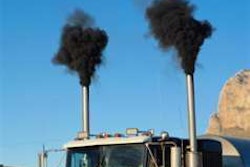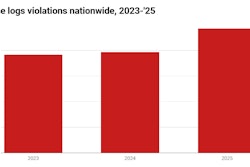The next step in Daimler Trucks North Americas’ relentless quest for more fuel efficient trucks appeared today at a press conference on the eve of the Freightliner’s annual dealer meeting in Washington, D.C. today.
The 2014 Cascadia Evolution is exactly what its model name implies: a sophisticated and well-designed step forward in terms of fuel efficiency and powertrain optimization, building upon the company’s highly successful Cascadia highway tractor.
“Our customers are looking for some very specific things from truck manufacturers based on the daily challenges they face,” says Mark Lampert, senior vice president, sales and marketing, for Freightliner. “Raising fuel prices, driver shortages, and slim profit margins all play a part in their buying decisions. Trucking is a penny business: We know that event the smallest improvements to a truck’s overall efficiency directly benefit our customers’ bottom lines.”
According to David Hames, general manager, marketing and strategy for Daimler Trucks North America, several key advancements have made these impressive fuel economy increases possible for the Cascadia Evolution, which will be the standard Cascadia spec beginning in 2014. These improvements include substantial upgrades to DTNA’s Detroit DD15 diesel engine, including a new, ACRS fuel rail system, a new water pump design to reduce parasitic engine drag and an asymmetric compounding turbocharger. These enhancements are combined with an enhanced exterior aerodynamic package to achieve substantial fuel economy gains which Hames says have been validated in wind tunnel, closed-track and real-world test conditions.

Hames says the Cascadia Evolution will also include a premium-fuel-efficiency specification model including extras like an integrated automated manual transmission, wide-based single tires, wheel covers and trailer aerodynamics. This model, he notes, achieved a fuel economy average of 10.67 miles per gallon while pulling a 76,000 pound trailer during a Type IV test-run on Continential Tire’s test track in Texas. “And we had heavy rain during the early part of the run,” Hames notes. “And that affected our performance somewhat. I feel like if we’d had fair weather the entire run the Evolution would have easily achieved 11 miles per gallon during the test.”
Further validation testing was done during the truck’s Evolution Efficiency Tour, which compared a current Cascadia’s performance with an Evolution tractor in a coast-to-coast run from San Diego, CA to Gastonia, NC. Hames says that by trip’s end, the Evolution tractor had averaged a 7 percent increase in fuel economy running in a variety of real-world driving conditions that Freightliner customers and drivers encounter every single day out on road.
The Cascadia Evolution will enter production in the 1st quarter of next year.









